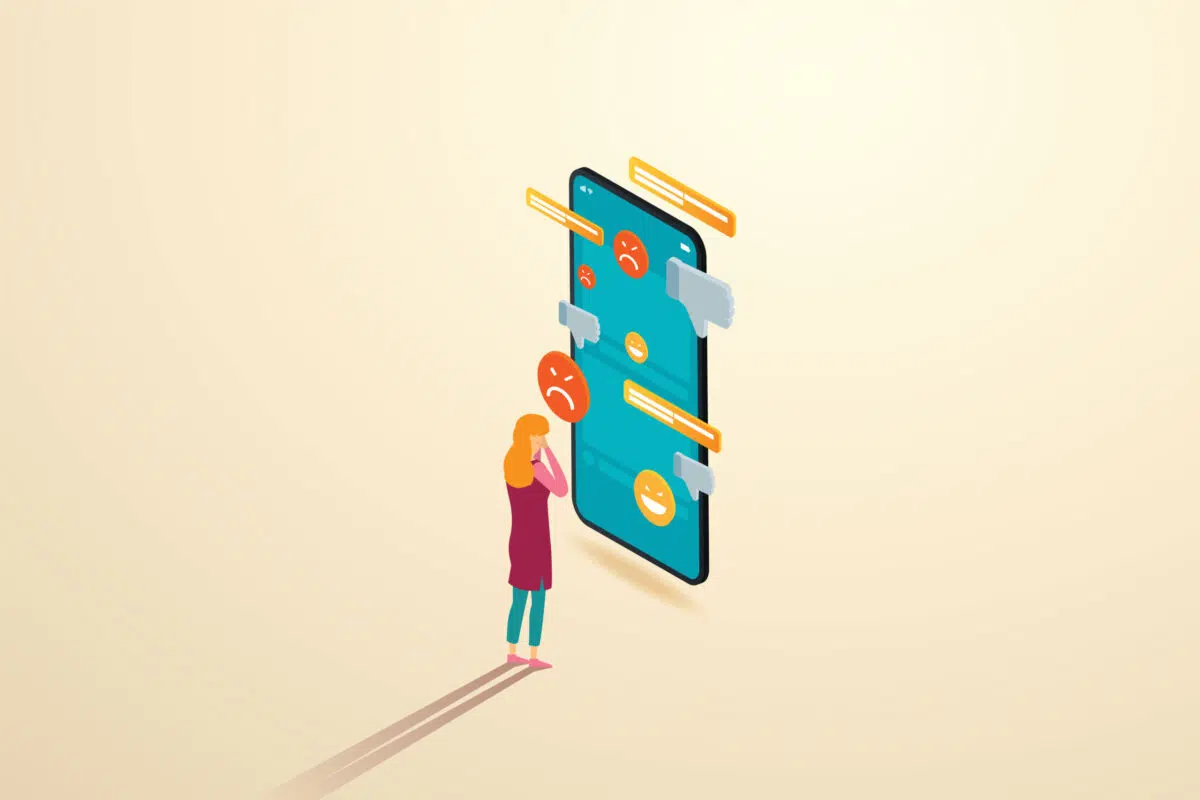Social media use is linked to a decline in mental health, especially among teens. Fortunately, there are a number of ways that can protect your mental health online. But how do you know if you need to take those steps?
WellTuned spoke with Laura Bertrand, a licensed professional counselor and mental health expert at BlueCross BlueShield of Tennessee. She shares ways to assess your relationship with social media and evaluate its impact on your mental health.
Why social media can make you feel unsettled
Laura Bertrand: It’s easy to say, “Oh, I just stay on Facebook because that’s how I keep up with my college friends” or “I like TikTok for the silly dances.” But social media tends to keep pushing whatever it thinks will keep our eyes on the screen longer.
Online platforms make money from your engagement with social media through advertising and data sales. One way they maximize your engagement—and prolong it—is by generating negative emotions. You may start to believe things that aren’t really true. Or, you may feel envious of other people, even if you know they’re presenting carefully curated images to you.
Now, consider the constant stream of notifications that pop up on your phone. They can provide additional negative input or comparisons that could make you feel worse about yourself.
5 questions to should ask yourself
Laura Bertrand: If you’re concerned that your social media habit may be taking a toll on your mental health, ask yourself these key questions. A thoughtful assessment may help you get a better handle on its impact and if you should try to limit your use of it.
- How much time do you spend on social media?Keep an honest log of the time that you spend checking in on your favorite social media platforms. Did you delay or skip other activities so you could scroll? It might be cause for concern if you’re letting social media replace your other activities.
- How do you feel when using social media? Assess how you feel in the moment. When you’re scrolling through photos or posts, how do you feel? How do you feel when you stumble across a post or a video that makes you angry?
- How do you feel later on? Later in the day, ask yourself if you’re still thinking about the images or words that you saw earlier. Do they make you feel stressed or anxious?
- Are you deliberately seeking social media that generates negative feelings? You might be seeking out social media that increases your negative emotions. Your smartphone provides a nearly endless stream of stimuli for your brain in the form of social interactions. These social interactions cause your brain to release dopamine—even the negative ones. Your brain gets used to that, which can increase your desire to go online, even subconsciously.
- Do you follow accounts that make you feel bad? If you regularly feel bad about yourself after you view posts from a particular account, block them or unfollow them. This is even for accounts of those you consider friends. Carefully choosing who you follow and interact with is an important method of self-protection.
If you need to cut back…
Laura Bertrand: Once you have a better handle on your social media use, you can take the next step. That might be setting limits so that you don’t spend too much time on social media. Set a timer to enforce the limit. Or, turn on the “do not disturb” function or “airplane mode” so you won’t be interrupted (or tempted) by a stream of notifications. You can even use an app to help you.
If you find it hard to restrict yourself, consider removing social apps from your phone. You can restore them later if you decide to use them again. You could also consider deactivating your accounts for a while to help you break the habit of using them.
Put the phone down and head outside
Finding other ways to connect with the world around you can start to undo some of the toll that social media may have taken on your mental health. Finding meaningful ways to focus your attention on people and your community can increase chemicals in the brain to reduce stress and anxiety and help you feel calmer.
“Putting your phone away might be really hard at first because we are all conditioned to reach for it every few minutes,” Laura says. “But limiting phone time to increase our contact with people can be a huge boon for our mental health. And, putting our devices down and going outside are good for both mind and body.”






Comments